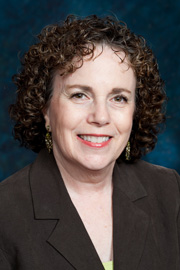By Emily K. Alhadeff, Assistant Editor, JTNews
When Rabbi Sarah Newmark answers the phone, she sounds a little scattered. She’s trying to compose a Rosh Hashanah talk, but she can’t decide what to write on.
“Yesterday I was leaning to ‘Al chet,’” she says, but had begun to gravitate toward Kol Nidre. Either way, she set a deadline to decide by that night.
“There’s just a lot of firsts going on in my life right now,” she says.
Although she’s been in the rabbinic role at Bremerton’s Congregation Beth Hatikvah for a year, she just started as its permanent rabbi on September 1.
“Nothing is different and everything is different,” she says.
For the past several years, the small peninsula congregation, a 40-minute ferry ride from Seattle, has employed either Seattle-area rabbis who come to serve the congregation for select, important occasions like High Holidays, or student rabbis imported from Hebrew Union College in Los Angeles.
“They never had a rabbi who didn’t come by a ferry,” says Newmark, who lives in Gig Harbor.
Newmark considers the position at Beth Hatikvah as meant to be. While in school in Pennsylvania, she says, “We were sojourners there. We were coming home, which I defined as roughly south of the Canadian border, north of the California border and west of the Cascades.” When her husband, an ear, nose and throat doctor, found a position in Lakewood they decided to settle in Gig Harbor. Newmark drew a wide radius around job-search territory, and it just so happened that around the time she was looking for a position, Beth Hatikvah had an opening.
“Oh my gosh, this is bashert,” was Newmark’s response.
After years of Jewish lay leadership and involvement with Temple B’nai Torah, where she served as president, Newmark chose to embark on a second career as a rabbi. She enrolled in the Reconstructionist Rabbinical College and moved with her husband Zephron to Pennsylvania.
Newmark, who likes to go by Rabbi Sarah, grew up in the Conservative movement and has spent her adult life in the Reform movement. Personally, “Reconstructionist is the best fit in terms of theology,” she says.
Reconstructionist rabbis are also often flexible enough to take over pulpits of other affiliations or congregations that can’t decide on their affiliation. This was the case with Beth Hatikvah, which years ago voted by a margin of one vote to affiliate with the Reform movement over the Conservative.
“I prefer a more traditional liturgical framework,” Newmark says; however, “I feel really comfortable in the Reform setting.”
Yet these differences of praxis are not too much of a concern. Over the years of roving rabbis, Skype-chat Bar Mitzvah lessons and transient Navy families, rather than falling apart, “These people have created a kehillah, a sacred community,” Newmark says. “That community-based congregational view” is very Reconstructionist.
“They’ve done such a great job of creating a continual presence on the Kitsap Peninsula,” she says. “They’ve done an extraordinary job, but they’ve never had professional leadership.”
Newmark details the effects of an absence of a constant rabbinic presence in this summer’s issue of Reform Judaism magazine. While being introduced to the young members of the congregation’s small religious school, who go by their Hebrew names in class, Newmark learned that several had inaccurate meanings and incorrect pronunciations. Literally, things got lost in translation.
“They never had Selichot services,” she says. “They’ve never had Shavuot services.” These issues, along with a long list of other programs, are on Rabbi Sarah’s to-do list.
“I’m launching about 10 things,” she says. “I just take it one day at a time.”
Among her ambitions are a book group, a post-B’nai Mitzvah educational program, tikkun olam projects with local churches, more connections with nearby synagogues like Kol Shalom on Bainbridge Island, adult education, Jewish parenting classes, conversion and Jewish 101 classes, and another, more spirited and family-friendly Shabbat service called “Shabbat ruchanit.”
“I’m pretty ambitious,” she says. “I realize everything I want to accomplish is really a five-year plan.”
“Rabbi Sarah has lots of energy and new ideas and will take the congregation in the direction we need to go,” says Deborah Vaughn, Beth Hatikvah’s president. “I think overall this is really positive. There are always people who are averse to change. I guess the one thing is: We shouldn’t change too much too fast. [But] I think most changes are really welcome and needed.”
Besides leading a remote community where, Newmark says, “I can go weeks without seeing another rabbi,” Newmark has a unique opportunity to engage with Navy families and sailors who come ashore for brief stints on dry land.
A ship captain called to seek out Rosh Hashanah services for seven sailors. Once, a sailor walked into the synagogue on his own looking for Shabbat services. In another instance, Newmark was called to counsel a woman in a medical emergency whose husband was on a submarine in a classified location.
“I’d never dreamed of these parts of the rabbinate,” Newmark says.
Newmark has found that congregants — including children and teens — are excited to have a rabbi they can call their own.
Vaughn is enthusiastic about the consistency Rabbi Sarah’s presence brings, especially when it comes to lifecycle events. “What I want most is something that my daughter didn’t have,” she says: “A consistent rabbinical presence.
The congregation is almost entirely volunteer-led, so much so that Newmark wants to create a logo with a figure carrying a potluck dish. When the synagogue holds potluck kiddush lunches, she happily finds she can’t get members to leave. She’s considering starting the book group on Saturday afternoon.
“They’re not leaving anyway,” she says.
While Newmark has been in service at Beth Hatikvah for over a year, her job description has evolved.
“It’s different for them to say, ‘this is my rabbi,’ she says. “And it’s different for me to say, ‘these are my congregants.’”
